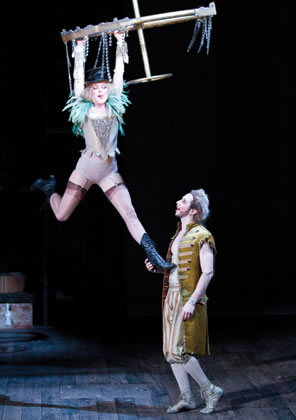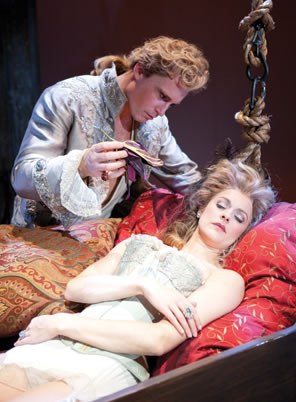A Midsummer Night’s Dream
Harnessing the Power of Imagination
Shakespeare Theatre Company, Harman Hall, Washington, D.C.
Wednesday, November 28, 2012, D-120&121 (center left stalls)
Directed by Ethan McSweeny

The First Fairy (Nancy Anderson) talks with Puck (Adam Green). Photo by Scott Suchman, Shakespeare Theatre Company.
The bottom line is that A Midsummer Night’s Dream should make you laugh. Yes, pun intended. So, if you can accept the over-conceptualized setting with anachronistic and logistical inconsistencies, the gorgeous verse given trudging treatment by some performers, and superfluous stage business—including gratuitous mud wrestling—stomping all over some of the play’s best lines, if you can accept all that you will regard this production as an enjoyable hoot. Especially Bottom.
You also will see an ingenious representation of Puck that came about almost by accident.
Director Ethan McSweeny likes to dress up his Shakespeare in finely detailed conceptual settings of specific places and times: a Merchant of Venice in Eastside New York City circa 1920, a Much Ado About Nothing in Cuba circa 1930, and now this Midsummer Night’s Dream in a decayed theater circa 1945. This can force both the verse and significant aspects of the plot into dead-end alleys, such as Theseus (Tim Campbell) and Hippolyta (Sara Topham) opening the play with formal speeches of peace at war’s end (their war, of course, which stretches Shakespeare’s fleeting allusion of Athens-Amazon battles into a stilted piece of stage business). The lovers stumbling through “this wood” near Athens when they are actually in an abandoned theater (in Athens?) leads to many incongruous moments, too.
However, concepts can have theatrical payoffs, and in this case we are rewarded with a presentation of the spirits not as woodland fairies but theater ghosts. Oberon and Titania (Campbell and Topham) are dressed as Regency actors doing Molière, and the other sprites wear whatever they’ve nicked from the wardrobe department. Titania’s bower is a grand piano that is raised above the stage, and the old chandeliers become trapeze for the acrobatic fairies.
Though too much detail creates awkward anachronisms, McSweeny intends his conceptual settings to effectively explore thematic subtexts of Shakespeare’s plays. His New York Merchant amplified that play’s economic caste system and interrelationships of metropolitan sub-populations. His Cuban Much Ado brought out the role of women in a society riveted to religious and economic custom. For this Dream, the overriding theme is the power of imagination. The word imagination and its synonyms seem to get particular emphasis, and Theseus’ speech on the lunatic, lover, and poet comes on the heels of having seen all three become one, fourfold.
Thanks to the theater setting, we get not just a play (Pyramus and Thisbe) within a play but the whole proceeding of this Midsummer Night's Dream is a play within a play: We are in a theater watching a theater watching theater. Ironically, this multilayered structure magnifies a simple reality, that not only is theater built on imagination, but imagination is our own private theater.
This played out in subtle ways with the four lovers wandering about the, um, woods. As Demetrius (Chris Myers), in prep club blazer and carrying a golf club as his “weapon,” argues with Hermia (Amelia Pedlow, who found Hermia’s quick-fuse temper early in the play) about Lysander’s whereabouts, Puck—perched on a chandelier—slickly pulls the club up out of Demetrius’ hand. When Demetrius realizes it is missing, he starts looking for it while continuing his dialogue with Hermia, who ends up under the chandelier; Puck slips the golf club into her hands. She has no idea how it got there, but she has a weapon now to flail at Demetrius.
This sequence does more than elicit two good laughs. It and similar pieces of stage business illustrate how the woodland scenes are imagination run amok. Oberon’s love potion mistakenly applied by Puck might be the catalyst of all the mayhem, but it’s really Shakespeare’s taking his four lovers to an extreme state of raw emotion that we enjoy like a daydream that escalates in ever-fanciful plateaus. In our own lost-in-the-woods way of thinking, irritation with our boss might prompt us to imagine what we might say in the staff meeting, but by the end of our commute we are running the company and the boss is in jail; or we might ponder whether a certain someone would ever notice us and, by the end of our walk, we envision that someone latched to our side as we rise to Nobel Prize–winning superstardom. Lord, what fools we mortals be. And as in our fantasies, Shakespeare draws out the lovers' conversations and dawning realizations without waylaying the mounting emotions.
In the physical accompaniment to the verbal scramble over who loves whom and who no longer loves whom and, indeed, hates whom, Hermia and Helena (Christiana Clark) end up stripped to their 1946 lingerie. Stripped to their boxer shorts are Demetrius and Lysander (Robert Beitzel who, in plaid shirt and jeans and constantly strumming his guitar as he meanders through Shakespeare’s verse, seems like he stepped out of That ’70s Show). All are soaking wet and covered in cement-like mud.
How did they get there? Not Hermia-Helena-Demetrius-Lysander but how did Pedlow-Clark-Myers-Beitzel end up wallowing in mud? Enter Adam Green as Puck. In a post-show talkback, Green revealed that the blocking for this scene never quite gelled until, well into rehearsals, McSweeny decided to bring Puck down from his box seat (eating popcorn with Oberon) and influence the action: Handing the women buckets of water to splash at each other, mixing the cement and pouring it onto the stage. Though this is not in the play’s original stage directions, it makes for an honest Puck, because Shakespeare hints that this Goodfellow isn’t as entirely innocent as he maintains. “This is thy negligence,” Oberon tells him at the end of the scene (after the fairy king has already admonished him at the beginning of the scene for mistaking the two Athenian men). “Still thou mistak’st, or else commit’st thy knaveries willfully.” Still indicates continuing. The First Fairy introduces us to Puck with a litany of his mischievous acts, yet Shakespeare’s text shows no manifestation of his mischievous ways except with Bottom (and that prank is in keeping with his master's plot against Titania). Green during the talkback said that by becoming involved in the lovers’ fight, he was better able to embrace his character. Truly, this is the 16th Dream I’ve seen on stage but the first time I’ve seen a Puck who lives up to Shakespeare’s billing.

Oberon (Tim Campbell) applies the love juice to Titania (Sara Topham). Photo by Scott Suchman, Shakespeare Theatre Company.
While love can send one’s imagination into a frenzy, a more institutional version of imagination run amok is good theater—or, in the case of Pyramus and Thisbe, really, really bad theater. McSweeny throws every amateur theater faux pas into this Dream’s climactic presentation of the rude mechanicals’ production, from falling sets and wardrobe malfunctions to wrong sound cues and miss-timed blocking (when Thisbe kisses Wall’s hole, she really does). The production is so awful to be so funny that the insults of the palace courtiers seem more like impulsive reactions shared with fellow audience members than mean-spirited barbs. Credit brilliant casting: David Graham Jones as Flute playing a flighty Thisbe; the tall Herschel Sparber as the tinker Snout who has fashioned his Wall out of strings of cans draping from his arms; Robert Dorfman as Snug delighted at his opportunity to roar like a lion; and Christopher Bloch as Starveling totally out of his element even playing something so simple as Moonshine. Ted van Griethuysen brings to the part of Peter Quince a love of theater that seems entirely natural in any organizer of an amateur dramatic society, singing some Broadway tune at each of his entrances: “There’s No Business Like Show Business” marks his initial entrance; he whistles as he works to set up the rehearsal; he shakily ekes out “You’ll Never Walk Alone” after Bottom’s transformation. This Quince with a passion for theatrics would certainly be taken with Bottom.
For nobody has an imagination that gallops quite as much as Bottom’s, and Bruce Dow plays him to the hilt as a generally good-natured fellow whose vision of himself far surpasses his own reality. He reminds me of Jackie Gleason, not in Ralph Kramden mode but in the character of Reginald Van Gleason III, the full-of-his-own-fantasies millionaire, dashing in his topcoat, hat, and cane, sweeping his arms as he talks to fill as much space with as much of his self as he can emote. Bottom prattles on about different types of beards (this proves his supposedly superior knowledge of theater). He doesn’t chew the scenery; he becomes the scenery. And he gamely perseveres in acting Pyramus despite vying with his own visor, despite the falling scenery or towering Wall’s formidable anger when his costume is damaged, despite Quince mistakenly playing the “William Tell Overture” upon Pyramus’ entrance at Ninny’s tomb, and despite Theseus’ interpolation. Still, the pinnacle of Dow’s performance comes earlier when, in rehearsal, Quince corrects his line reading, and Dow’s Bottom spends some five minutes of affected consternation willing himself back into character.
The line between Bottom and Pyramus (as well as Bottom and the ass) is a fine one, and blurred, too. The same could be said regarding the lovers between their sane and drugged states. However, there is no line between the Athenian lords and the fairy royalty. Doubling these roles is a long tradition that probably dates to Shakespeare’s initial production, but McSweeny doesn’t so much double the characters as merge them. Campbell is a particularly enchanting Oberon, even in his anger, and the reason we can accept his bullying of Titania is that we see an easy benevolence in his Theseus, even in his handling of Hermia’s marriage choice. (It also helps Oberon's case that this production has a young boy—Maxwell Balay—playing the changeling, and though he happily plays with Titania’s attendants, he seems perfectly delighted to become Oberon’s henchman.) Green portrays Philostrate as straight-laced stiff as Puck is limber and loose, but both have a penchant for startling his boss (a fun running joke), and when Green’s Philostrate, with a gleam in his eye, describes witnessing the rude mechanicals’ rehearsal, we suddenly remember that Puck did witness their rehearsal—and took part, too. After the young lovers head to their marriage beds, Theseus and Hippolyta remain on stage, as does Philostrate, who picks up a broom and begins speaking Puck’s verse. He transforms into Robin Goodfellow before our eyes while the emerging fairies help the royal couple exchange into their fairy estate.
“This ditty after me sing, and dance it trippingly,” Oberon then commands, but Titania amends with “First rehearse your song by rote.” These theater ghosts know that it takes lots of practice to turn visions into a wondrous dream.
Eric Minton
December 5, 2012
This review also appears on PlayShakespeare.com
Comment: e-mail [email protected]
Start a discussion in the Bardroom



 Find additional Shakespeareances
Find additional Shakespeareances